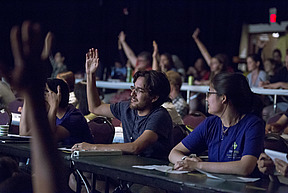
PCMI 2020 Undergraduate Summer School
The Undergraduate Summer School (USS) at PCMI provides a unique opportunity for undergraduate students to learn some fascinating mathematical ideas in a setting that allows them to interact with mathematicians at all levels. The program itself is typically centered around lecture series delivered by leading experts on topics related to the main research theme of PCMI that summer. These lectures generally present material not usually part of an undergraduate curriculum, allowing students to become familiar with key ideas and techniques in the field, and often leading toward further research. The program is structured so that students at different levels will have many opportunities to learn new things.
The USS is not like a typical REU in several ways. The focus of the USS is more on the specialized lecture series and most importantly, the ability to interact informally with the many graduate students and researchers attending other parts of PCMI. Students can get to know mathematicians who have pursued a wide variety of career paths, and they can get a sense of which of these paths may be most appealing to them. Many USS participants report making connections that strongly influence their choice of graduate school. Interactions are fostered by the various informal social activities open to all PCMI participants, as well as daily "cross-program activities," which include lectures and presentations on topics of general mathematical interest. Members from all parts of PCMI may take part in the Experimental Math Lab, in which small groups of participants with close mentorship from a more senior mathematician investigate open-ended problems and report on their findings at the end of the three-week Summer Session.
The USS is open to undergraduate students at all levels, including those who have just completed their undergraduate studies. Participants are expected to be in residence for the entire three weeks of PCMI.
The 30th Annual PCMI Summer Session will be held July 5 - July 25, 2020.
Reseach Theme: Number Theory Informed by Computation.
In 2020 there will be one daily lecture series at 1pm, given by Adriana Salerno (Bates College), and the morning sessions will involve experimental mathematics component with open-ended problems and computational work. Here is a rough outline of Professor Salerno's lectures:
Course Description: This course is an introduction to p-adic numbers, which are fascinating but lesser known than rational, real, and complex numbers. The study of p-adic numbers blends together many parts of mathematics and has numerous applications, including to physics. These numbers are an analogue of the real numbers, and as such many of the concepts from calculus extend naturally. However, differences in the geometry and the calculus of these numbers lead to interesting discoveries and insights; in this geometry, for example, all triangles are isosceles, and every point inside a circle is the center of the circle. Topics may include the study of absolute values on a field, basic properties and geometry of p-adic numbers, sequences and series, functions and their derivatives, power series, and interpolation.
Prerequisites: Linear algebra, a proof-based course, and either real analysis or abstract algebra. A course in number theory would be helpful, but is not required.
